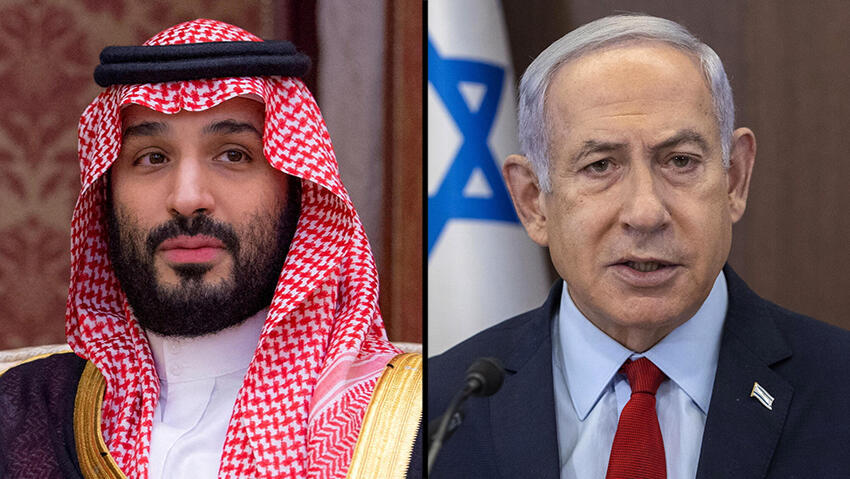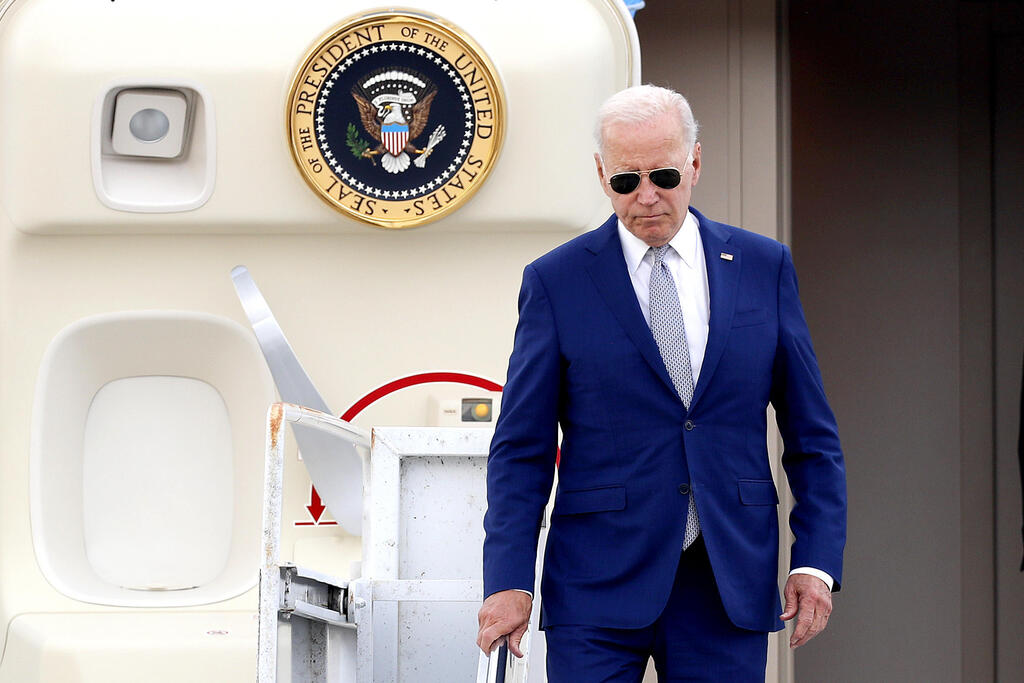Getting your Trinity Audio player ready...
Behind closed doors, Israeli officials are engaged in discreet collaboration with the Biden administration to advance a controversial plan, the Wall Street Journal reported on Thursday, citing US and Israeli officials. This proposal involves the establishment of a U.S.-operated uranium-enrichment facility in Saudi Arabia, forming a pivotal component of a complex three-way agreement aimed at formalizing diplomatic ties between the two nations in the Middle East.
Read more:
High-ranking Israeli figures, including Prime Minister Benjamin Netanyahu, have instructed leading nuclear and security experts from Israel to lend their expertise and work alongside U.S. negotiators. The objective is to find a middle ground that would enable Saudi Arabia to openly engage in uranium enrichment, making it the second country in the region, following Iran, to do so openly.
2 View gallery


Israel and Saudi Arabia warming up to each other?
(Photo: Amit Shabi, Bandar Algaloud/Courtesy of Saudi Royal Court/Handout via REUTERS)
In a groundbreaking development, discussions between the United States and Saudi Arabia have been underway to forge a comprehensive normalization agreement. This agreement would involve the Saudis acknowledging and establishing diplomatic ties with Israel and also entails significant concessions, including assistance in the kingdom's pursuit of a civilian nuclear program with uranium enrichment capabilities within its borders. Furthermore, this evolving deal is expected to incorporate provisions addressing the concerns of the Palestinians, as well as providing security guarantees from the United States.
Both the United States and Israel have yet to reach consensus on a proposal that would permit uranium enrichment within Saudi Arabia. However, if such an agreement were to materialize, it would signify a significant departure from the long-standing policy of both nations. For decades, leaders from various political backgrounds in the United States and Israel have diligently sought to impede the development of uranium enrichment capabilities in Middle Eastern countries.
Mark Dubowitz, the CEO of a Washington think tank that is less than thrilled about this development, said: "Israeli support for Saudi enrichment would represent a radical policy shift for a country that has opposed nuclear proliferation in the Middle East since inception, and for a prime minister who has devoted his career to opposing Iranian enrichment."
MBS interviewing with Fox News
(Video: Fox News)
Israel's nuclear capabilities is likely the worst kept secret in geopolitics, and that makes it the sole country in the region with such capabilities. Unsurprisingly, Israel is staunchly opposed to the prospect of hostile nations gaining entry into this exclusive club. While the specifics remain under wraps, it is widely believed that Israel relies on plutonium for its nuclear arsenal.
However, the revelation of these classified details came at a cost. Mordechai Vanunu, an Israeli nuclear technician, paid a heavy price for his disclosure in the 1980s. He spent a staggering 18 years behind bars after divulging information about Israel's clandestine weapons program, which included the existence of a covert uranium-enrichment facility.
Saudi Arabia's quest for uranium enrichment has become a highly challenging hurdle for leaders from the United States and Israel as they strive to craft a transformative agreement that could reshape the dynamics of the Middle East.
Following the eagerly-anticipated Biden-Netanyahu meeting in New York, an Israeli official added that any deal involving Saudi Arabia developing their own nuclear capability, would necessarily involve multiple security measures, adding in an interview with the Wall Street Journal: "We saw eye to eye regarding the nuclear issue from the beginning - what we can't do, and what we probably can."
In a noteworthy development, Saudi Crown Prince Mohammed bin Salman has underscored the gravity of ongoing negotiations regarding normalization with Israel. He expressed optimism that an agreement is inching closer each passing day. However, the crown prince emphasized a crucial condition: should Iran acquire a nuclear weapon, Saudi Arabia would be compelled to pursue the same path. This stipulation adds a layer of complexity to the delicate negotiations.
Despite Saudi insistence that Iran will not be the only Muslim nation to have nuclear power, the kingdom did, at least in principle, agree to a deal which stipulates that any Saudi nuclear facility would be managed by American personnel.
The Saudi crown prince conveyed his optimism about the ongoing normalization efforts in an interview with Fox News on Wednesday, dismissing rumors that negotiations had been put on hold. He reaffirmed that progress was being made, asserting that "every day we get closer" to a resolution.
In addition, the crown prince expressed enthusiasm for the potential agreement, referring to it as a monumental milestone comparable to the significant events that occurred since the conclusion of the Cold War. However, he noted that the negotiations with Israel were contingent upon progress being achieved on the Palestinian issue.
"If we have a breakthrough of reaching a deal that give the Palestinians their needs and make the region calm, we're going to work with whoever is there," MbS stated in the interview.





